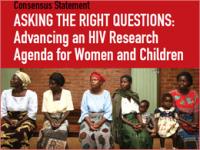
Reportaje
On International Women’s Day, UNAIDS, IAS and 14 partners launch new agenda to improve scientific research for women and children
08 de marzo de 2010
08 marzo 201008 marzo 2010

Credit: UNAIDS/A. Gutman
As the world marks International Women’s Day, there is growing concern that women and children are bearing the brunt of the AIDS epidemic. To turn the tide, UNAIDS, the International AIDS Society (IAS) and 14 other leading public and private sector organizations have teamed up to release a new scientific research agenda.
The report called, “Asking the Right Questions: Advancing an HIV Research Agenda for Women and Children” includes 20 specific recommendations to expand and improve responses to the HIV-related challenges facing women and children worldwide.
“With this roadmap, we can work together to remove the roadblocks to universal access to HIV prevention and treatment and move forward to a world where women and children are no longer left behind,” said UNAIDS Executive Director Mr Michel Sidibé.
HIV is the leading cause of death and disease among women of reproductive age. The majority of the estimated 33.4 million people living with HIV in 2008 were women and children.
With this roadmap, we can work together to remove the roadblocks to universal access to HIV prevention and treatment and move forward to a world where women and children are no longer left behind,
UNAIDS Executive Director Mr Michel Sidibé
The Agenda was developed through extensive consultation with investigators, clinicians, civil society and UN agencies and was supported by an expert-led mapping exercise and literature review.
IAS Executive Director Robin Gorna said, “This agenda defines priority research needed to greatly improve our knowledge about and capacity to prevent and treat HIV in women and children. Implementation of this research agenda is key to closing these knowledge and service gaps and to saving women’s and children’s lives.”
The report identifies priority research questions within four broad categories: 1) clinical research on preventing mother-to-child transmission and pediatric treatment, 2) clinical research on women’s treatment issues; 3) operations research for women and 4) operations and implementation research related to stopping mother-to-child transmission.
To address these challenges, the report recommends increased investment in research, greatly expanding data sharing on HIV and women and children, as well as greater efforts to separate clinical data by gender.
The full research agenda on women and children is available online at www.iasociety.org/ilf.aspx.

